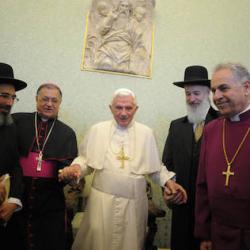Derek Rishmawy is on to me. In a charitable review of The End of Protestantism, he sees through my effort to make a proposal that is “pre-emptively impervious to critique.” He’s right that I admit “that any number of my worries are indeed possible, but insists that we should try anyways.”
Derek spins off a plausible thought experiment. Churches attempt, as I’ve suggested, to work as a unified communion of congregations at a local level. That project may end up splitting denominations. If ten UMC churches want to get into the project, and 10 don’t, then the pursuit of unity may cause a rift among the Methodists. Derek also suggests that my proposal merely creates another regional denominational layer overlapping and intersecting with the current array of denominations. The ultimate result is more paperwork on top of the denominational paperwork we already have.
The resulting regionalism is, he says, a serious problem: “One of the goods of national and international denominations, despite the social sources that may have originally helped form them, is that they keep us in contact with people who do not share all of our same, local myopias, temptations, and tendencies towards shared, cultural drift. Ironically enough, the regional Reformational catholicity of local metropolitan groups, if carried out in this fashion, may end up making them more parochial in a way that national and international denominations and communions help push back against.”
This scenario, as I say, is plausible. As I see it, the main implication is that the local initiatives toward unity need to be accompanied by denominational-level efforts toward unity. In the book, I focus on the local/municipal context for several reasons: Because I’m convinced that our world is becoming more and more a world of cities; because I wanted to outline an agenda for pastors and laypeople who don’t have denominational clout; and because denominational leaders are often instinctive turf protectors who are reluctant to consider any plan that would diminish their power. But Derek is right: The church isn’t going to achieve greater unity only by local efforts, and local efforts may complicate things at other levels. As Derek anticipates, I still think it’s worth the effort.
But I’m not convinced his worry about “parochialism” presents a real problem. Yes, denominations can provide a wider-than-local perspective on the church. The missionary comes to town and gives church members a glimpse of a wider kingdom. As Derek would not doubt admit, though, denominations have parochialisms of their own.
Are we left with a choice between rival parochialisms? I think not: In today’s world, we can connect through channels that have nothing to do with denominational affiliations. Just this week, I had a visit from an Indian pastor of a non-denominational church. I met him last year at a conference in Chicago; we have kept in touch by email; he asked me to visit India to teach the Bible to pastors in his network. I’m hardly unique. Virtually every pastor and theologian today is globally networked. The world’s on our doorstep and at our fingertips. Communion with the global church doesn’t have to run through the head office.















